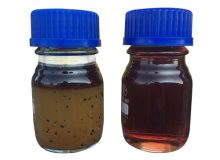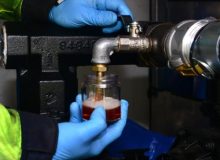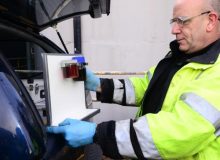Engine Manufacturers Recommend ISO 4406 for Fuel Cleanliness
Modern fuel systems are designed to reduce emissions, lower fuel consumption and improve engine performance. To achieve this they must operate at very high pressures, but engine manufacturers warn that this increases the risk of failure if the fuel used is not clean. To be recognised as clean the fuel must meet a rating of 18/16/13 on the ISO 4406 cleanliness scale. Manufacturers therefore recommend that clients should adopt a stringent fuel conditioning programme, especially if fuel is to be stored for 6 months or more.
- IPU’s ClearTank fuel cleaning service.
- IPU can support you with regular testing or train your maintenance staff.
Why is dirty diesel a problem?
When operating at high pressure any small, hard particles in the fuel become a source of potential system malfunction. If left untreated diesel contamination can increase to cause fuel filters to clog and the early wear of critical injection system parts. Depending on the size and nature of the particles, this can lead to:
- Reduced component life
- Component malfunction
- Fuel system and/or engine failure
Total engine failures can be expensive and in critical applications could lead to serious repercussions. Some engine manufacturers also state that if equipment failure is due to dirty diesel it is not covered by manufacturer’s warranty.
But what is ‘clean’ fuel?
Engine manufacturers (such as Cummins Inc,) suggest that for a fuel to be classified as ‘clean’ it must meet a rating of 18/16/13 on the ISO 4406 cleanliness code. If the fuel does not meet this standard it must be cleaned before it is supplied to the engine.
The ISO 4406 cleanliness code is expressed as a series of three numbers (x/x/x), which correspond respectively to the number of particles greater than 4, 6, and 14 microns. For example, the ISO 4406 rating of 18/16/13 translates to:
- 18 – Up to 2,500 particles larger than 4μm (per mL of fuel)
- 16 – Up to 640 particles larger than 6μm (per mL of fuel)
- 13 – Up to 80 particles larger than 14μm (per mL of fuel)
How does IPU ensure my fuel is clean to ISO 4406 standards?
IPU’s ClearTank service addresses the three main forms of fuel contamination: water, solid particulates and microbial growth (a.k.a. the diesel bug):
- Dissolved, emulsified and free water is removed down to 200 parts per million or less as specified in EN590:2009
- Solid particulates such as soot, rust and colloid carbon are removed
- Microbial growth (a.k.a. the diesel bug) is removed
- Any sludge that may have settled at the bottom of the tank is broken down and filtered out; ClearTank removes hardly any diesel
- Biofilms that form on the tank surfaces are removed. These are often immune to standard fuel polishing techniques.
Once complete, we certify that your tanks are clean and that your fuel meets the 18/16/13 standard as defined by ISO4406:2017.
Equipment failures due to dirty diesel can be disastrous, ensure your organisation is protected with a fuel conditioning programme from IPU.



